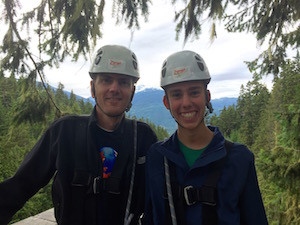
But I’m not here because of my own code contributions–I’m here as a chaperone. My 17 year-old son, Justin, earned his third trip to Work Week as an invited guest by dedicating time and code towards Mozilla’s mission of a free and open web.
Mozilla has thousands of contributors worldwide. Only a handful get invited to Work Week, so this is a Proud Open Source Dad Moment® for me, but I thought I’d share his story in the off chance that it motivates you or your kids to participate.
A few years ago Justin asked how he could get more involved in an open source project. He had just finished Google Code-In, which matches up High School students with open source projects. It’s a cool program, but it only lasts a few months and the projects he contributed to were somewhat esoteric. He was looking for two things in a project: it needed to mean something to him personally so that it would hold his interest and it needed to offer a technical ramp that would help grow his skills.
I told him to take a look at Mozilla. My own experience contributing to Mozilla was that they were good at getting contributors aligned with projects based on their skills and interests (check out their signup page).
At the time, Justin was new to coding. I had taught him Python but he wasn’t feeling confident enough to put those skills to use on a public project. So he started reviewing and editing technical documentation. This was a perfect place to start because it offered a chance to learn more about the culture of the organization and its tools and processes while also being exposed to the dizzying array of products, acronyms, and technologies in play at Mozilla.
(For more on teaching kids to code, see “Kids these days: Learning to code then and now“).
Then one day I walked into Justin’s room. He was hammering away at his laptop. “What are you working on?”, I asked. Without looking up he replied, “I’m writing some automated test scripts in Python using Selenium.” He was clearly “in the zone” so I just said, “Oh, cool,” and headed back down the hall, but I was pretty pumped–my kid was committing code.
Justin had found his way onto the Web Quality Assurance team. They make sure all of Mozilla’s sites are running correctly. This led to a cool father-son moment. I had been contributing some code to Mozillians, which is one of the sites Justin’s Web QA team was responsible for. Justin came to me with a problem: He could improve the efficiency of his tests if a small change was made to one of the site’s pages. He was reluctant to make the change but he knew I could do it quickly, so I did, and we ended up spending an afternoon hanging out in his room, squashing bugs and testing.
As his confidence and skills grew, so did his influence and responsibilities within Mozilla. He became a “vouched” Mozillian and, later, was added to some of the internal systems reserved for trusted contributors, and was ultimately granted the ability to commit code directly to Web QA’s projects. He participated on as many of the team’s online meetings as his school schedule would allow, began mentoring other contributors, and was given his own project to run.
This gradual increase in trust and recognition that occurs over time as a contributor spends time with a project is a key part of what makes open source work. He and I had discussed “open source” as a concept a lot, but it didn’t really sink in until he became part of it, and it has been wonderful to watch.
Something that’s been particularly instructive is how Mozilla treats its contributors. During a family vacation to San Francisco we toured both of Mozilla’s offices. Every person we were introduced to stopped what they were doing and thanked us. We felt special and appreciated.
This attention extends to code contributions. When I made my first contribution I worked with a mentor of sorts who helped me understand the workflow and coding standards for the project. If he didn’t hear from me in a while he’d shoot me a note to see if I still had time to work on the project. His continued interest made me feel like my contributions mattered, even if they were small.
Justin’s mentor went even further, offering career advice and making personal introductions. He’s even been helping Justin find internship opportunities.
When I think about everything his Mozilla experience has given him, I’m amazed. Of course he’s been apply to apply his coding skills in real world applications. But there is also a set of important technical skills that are hard to teach in a classroom, like how to be productive in a multi-developer git workflow. Perhaps more crucial are the softer skills, like how to give constructive feedback to teammates or how to pitch an idea. And the cool thing is that while he’s soaking up all of this, he’s helping further Mozilla’s mission, which is something both of us believe in.
If you know someone who believes in a free and open web, and they have the time and interest to get involved and to stick with it, encourage them to signup and get involved. There’s plenty to do for all skill levels and interests.
